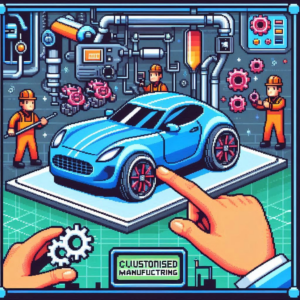1. Introduction
The evolution of manufacturing paradigms has transitioned from traditional mass production to a more flexible model known as customized manufacturing (CM). This shift is driven by the increasing demand for personalized products and the need for stringent quality control. Manufacturers must respond swiftly to changing consumer preferences while ensuring high standards in production. Traditional large-batch methods lack the adaptability required for individual customers. A new generation of smart factories is emerging, characterized by multi-variety, small-batch production capabilities, and enhanced quality control measures to maintain product excellence.
AI technologies play a pivotal role in this transformation. They enable manufacturers to integrate advanced information and communication technologies with traditional processes. This integration facilitates self-perception, operational optimization, dynamic reconfiguration, and intelligent decision-making. The key characteristics of a customized smart factory include:
1.1 Self-Perception
The ability of manufacturing systems to monitor and assess their operational status in real-time.
1.2 Operational Optimization
Continuous improvement of production processes through data analysis and machine learning.
1.3 Dynamic Reconfiguration
The capability to adjust production lines and processes in response to changing demands.
1.4 Intelligent Decision-Making
Utilizing AI algorithms to make informed decisions regarding resource allocation and quality control.
The customer-to-manufacturer model emphasizes direct interaction between consumers and manufacturing systems. This allows for rapid customization of products. This model enhances customer satisfaction and improves resource utilization and operational efficiency.
2. AI Technologies in Customized Manufacturing
AI technologies are integral to the implementation of customized manufacturing. They enhance various aspects of the manufacturing process, including design, production, management, and service, while also playing a crucial role in Quality Control. The following AI-driven technologies are particularly relevant:
2.1 Machine Learning (ML)
ML algorithms analyze historical data to predict trends, optimize production schedules, and improve quality control.
2.2 Deep Learning (DL)
DL is effective in image recognition and natural language processing. In manufacturing, DL can be used for defect detection.
2.3 Multi-Agent Systems (MAS)
MAS involve multiple autonomous agents collaborating to achieve common goals. Agents can negotiate resource allocation and adapt in real-time.
2.4 Internet of Things (IoT)
IoT devices collect and transmit data from manufacturing equipment. This connectivity facilitates the integration of AI algorithms.
2.5 Cloud and Edge Computing
Cloud computing provides the power necessary for processing large datasets. Edge computing allows for real-time data processing.
3. Implementation of AI-Driven Customized Manufacturing
The implementation of AI in customized manufacturing involves several key components, including Quality Control and following:
3.1 Flexible Manufacturing Systems (FMS)
FMS are designed to handle various products with minimal downtime. AI algorithms facilitate scheduling and coordination.
3.2 Dynamic Resource Scheduling
AI-driven dynamic scheduling mechanisms allow manufacturers to adapt to changing demands. This enables quick adjustments to plans.
3.3 Intelligent Fault Diagnosis
AI algorithms analyze equipment data to identify potential faults before they lead to failures. This approach enhances equipment effectiveness.
3.4 Personalized Product Design
AI tools enable manufacturers to offer customization options to consumers. This enhances customer satisfaction and fosters brand loyalty.
3.5 Supply Chain Optimization
AI technologies improve supply chain management by predicting demand fluctuations. This ensures manufacturers can meet customer demands.
4. Challenges in AI-Driven Customized Manufacturing
Despite the numerous benefits of AI in customized manufacturing, several challenges must be addressed, including ensuring Quality Control to maintain high standards and consistency in production.
4.1 Data Privacy and Security
The integration of AI and IoT in manufacturing raises concerns about data privacy. Manufacturers must implement robust cybersecurity measures.
4.2 High Computational Requirements
AI algorithms often require significant computational resources. This may necessitate the use of cloud computing solutions.
4.3 Integration with Legacy Systems
Many facilities still rely on legacy systems that may not be compatible with modern AI technologies. Upgrading these systems can be costly.
4.4 Skill Gap
The successful implementation of AI requires a skilled workforce. Manufacturers must invest in training to bridge this skill gap.
5. Future Directions
The future of AI-driven customized manufacturing is promising, with advanced automation and quality control ensuring precision, efficiency, and consistency in production. with several trends expected to shape its evolution:
5.1 Increased Automation
As AI technologies advance, automation levels in manufacturing are expected to rise. This will lead to more efficient production processes.
5.2 Greater Customization
The demand for personalized products will drive manufacturers towards flexible methods. AI will enable real-time customization.
5.3 Sustainability Initiatives
AI technologies can help manufacturers optimize resource usage and reduce waste. This aligns with global efforts to address environmental challenges.
5.4 Collaborative Robots (Cobots)
The use of cobots will become more prevalent. These robots can assist with tasks requiring precision and strength.
5.5 Enhanced Data Analytics
The integration of advanced analytics tools will enable deeper insights into operations. This leads to continuous improvement and innovation.
6. Conclusion
AI-driven customized manufacturing represents a significant advancement in the sector. It offers enhanced flexibility, efficiency, and responsiveness to customer demands. By leveraging AI technologies, including GCP AI services, manufacturers can optimize operations, enhance quality control, and improve product quality. However, addressing the associated challenges is crucial for realizing this potential. As the industry continues to evolve, the integration of AI will shape the future of production.
Do you like to read more educational content? Read our blogs at Cloudastra Technologies or contact us for business enquiry at Cloudastra Contact Us
